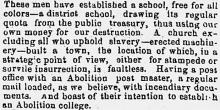The Abolitionists to be Expelled.
The citizens of Madison county met on Saturday, and resolved that John G. Fee and his brother Abolitionists in that county should be driven from it. They recite these as good reasons why their presence is unsafe in a community where slaves are held:
That these, their emissaries, openly avow their Abolition doctrines, and that they are bound by their consciences to propagate them. That their leader, recently in New York, proclaimed from the pulpit and the desk, his sympathy for and approbation of the late notorious John Brown, asserting that we needed more Browns in Kentucky, and asked for a donation of two or three thousand dollars only to revolutionize the State. These men have established as school, free for all colors––a district school, drawing its regular quota from the public treasury, thus using our own money for our destruction. A church excluding all who uphold slavery––erected machinery––built a town, the location of which, in a strategic point of view, either for stampedes or servile insurrection, is faultless. Having a post office with an Abolition post master, a regular mail loaded, as we believe, with incendiary documents. And boast of their intention to establish an Abolition college.
That the town is continually increasing by secessions of Northern men, all avowing the same doctrines; thus evincing a systematic and well laid plan, not only to destroy us, but in accordance with the declaration of their leader, to revolutionize the whole State.
These resolutions were adopted, and a committee appointed to carry them into effect:
1st. That a committee of thirty-eight discreet, sensible men, such as the whole community may confide in, be appointed to remove from amongst us J.G. Fee, J.A.R. Rogers, and so many of their associates as in their best judgement the peace and safety of society may require, and to this end all good men in this community will lend them support and assistance to the utmost.
2d. That in discharging this duty they are instructed to act deliberately, humanely, as may be; but firmly and most effectually.
In the meantime the Legislature now in session shall be petition to enact such laws as will give us complete security; to effect which, if possible, they are instructed to send a deputation to Frankfort to ask executive recommendation and Legislative actions.
3d. It is resolved further that the true policy of Kentucky is to bind together the domestic tie between slaves and their owners, and to this end they should not only worship the same God but at the same altars, and that separate negro preachers and ignorant negro preachers should be suppressed by the law.
4th. That any legislation for the expulsion of free negroes should be gradual, prospective and humane in its provisions, and in such we will most heartily concur.
5th. That in procuring these, our just and reasonable wants, our Senator and representatives are instructed to lend their best energies.
The following resolution was then offered by John C. Terrill and adopted:
Resolved, That the committee which has been appointed by this meeting do within ten days from this time wait upon John G. Fee, Rogers, and all others that the said committee may think inimical and dangerous to our institutions, our interests and our public safety and tranquility, and inform them that they must quit this county and State, and that they must be without the limits of this county within ten days after the time of receiving said notice––and that said committee are directed by this meeting to take such steps as they may deem right and proper in removing the said Fee, Rogers, &c., from the country if they are found within its limits after the time specified has run out.
The Rev. Abolitionist Fee wrote a letter asking for a delay, which was not heeded. He admits that they have agitated the subject of slavery, and claims it as a constitutional privilege.
"The Abolitionists to be Expelled," Louisville (KY) Daily Courier, December 21, 1859, p. 1

